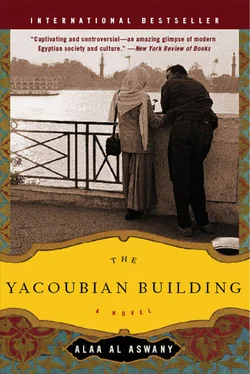Alaa Al Aswany - The Yacoubian Building
Здесь есть возможность читать онлайн «Alaa Al Aswany - The Yacoubian Building» весь текст электронной книги совершенно бесплатно (целиком полную версию без сокращений). В некоторых случаях можно слушать аудио, скачать через торрент в формате fb2 и присутствует краткое содержание. Год выпуска: 2006, ISBN: 2006, Издательство: Adobe Acrobat eBook Reader, Жанр: Современная проза, на английском языке. Описание произведения, (предисловие) а так же отзывы посетителей доступны на портале библиотеки ЛибКат.
- Название:The Yacoubian Building
- Автор:
- Издательство:Adobe Acrobat eBook Reader
- Жанр:
- Год:2006
- ISBN:978-0-06-087813-9
- Рейтинг книги:5 / 5. Голосов: 1
-
Избранное:Добавить в избранное
- Отзывы:
-
Ваша оценка:
- 100
- 1
- 2
- 3
- 4
- 5
The Yacoubian Building: краткое содержание, описание и аннотация
Предлагаем к чтению аннотацию, описание, краткое содержание или предисловие (зависит от того, что написал сам автор книги «The Yacoubian Building»). Если вы не нашли необходимую информацию о книге — напишите в комментариях, мы постараемся отыскать её.
The Yacoubian Building — читать онлайн бесплатно полную книгу (весь текст) целиком
Ниже представлен текст книги, разбитый по страницам. Система сохранения места последней прочитанной страницы, позволяет с удобством читать онлайн бесплатно книгу «The Yacoubian Building», без необходимости каждый раз заново искать на чём Вы остановились. Поставьте закладку, и сможете в любой момент перейти на страницу, на которой закончили чтение.
Интервал:
Закладка:

At rare and exceptional moments Souad Gaber appears as she really is. A look suddenly flashes from her eyes like a spark and her face recovers its original appearance, exactly as an actor returns to his own character on finishing a role, takes off his costume, and wipes the makeup off his face. On such occasions, a serious, slowly awakening look suggestive of a certain degree of hardness and determination appears on Souad’s face and reveals her true nature. This may happen at any time — while she’s eating with the Hagg or chatting with him of an evening; even while she’s with him in bed, she may be twisting and turning in his arms as she does her best to rouse his feeble virility and that spark will flash in her eyes confirming that her mind never stops working, even in the heat of passion.
Often she astonishes even herself with her newfound capacity to take on fake roles. She was never a liar before. All her life long she has been used to saying whatever’s on her mind — so where did all this acting come from? She plays with skill the role of the jealous, compassionate, yearning, loving wife and like a professional actor has learned to control her emotions perfectly: she cries, laughs, and gets angry whenever she decides to do so. Right now, in bed with Hagg Azzam, she is playing out a scene — that of the woman who, taken unawares by her husband’s virility, surrenders to him so that he may do with her body whatever his extraordinary strength may demand, her eyes closed, panting, and sighing — while in reality she feels nothing except rubbing, just the rubbing of two naked bodies, cold and annoying. With that sharp, lurking, unblinking awareness of hers, she contemplates Hagg Azzam’s exhausted body, whose brief last hurrah came to an end and whose feebleness manifested itself after one month of marriage, and averts her eyes from the whiteness of his old, wrinkled skin, the few, scattered hairs of his chest, and his small, dark nipples. She feels nauseated whenever she touches his body, as though she were putting her hand on a lizard or a revolting, slimy frog and each time she thinks of the slim, hard body of Masoud, her first husband, with whom she knew love for the first time.
Those were beautiful days. She smiles when she thinks how much she loved him and how she longed to see him, her body burning with his touches and the feel of his hot breath on her neck and breast. She would make love with him hotly and melt, swooning in pleasure and, when she recovered herself, feel shame. She’d turn her face well away from him and spend a while avoiding looking at his face, while he’d roar with laughter and say in his strong, deep voice, “My oh my! What’s the matter with you, girl, that you’re so shy? Did we do something naughty? It’s God’s Law, you silly girl!”
How lovely that time had been and how far away it seemed now! She had loved her husband and all that she’d wanted from the world was for them to live together and raise a boy. She swore she didn’t want money and she didn’t have any demands. She was happy in her small apartment in El Asafra South next to the railway tracks doing the washing and cooking, preparing Tamir’s feeds, and mopping the floor. Then she would take a shower, put on makeup, and wait for Masoud at the end of the day. She thought her home was as spacious, clean, and well-lit as a palace, and when he informed her that he had got a work contract in Iraq, she had rejected the idea, flaring up and fighting and banning him from her bed for several days in order to dissuade him from traveling. She had shouted in his face, “You’d go off abroad and leave us on our own?”
“A year or two and I’ll be back with lots of money.”
“That’s what everyone says and they never come back.”
“So you like being poor? We’re living day to day. Are we going to go our whole lives borrowing money?”
“Soon enough the little one will be grown up.”
“Only in this country! Here everything’s backward! Here it’s the old who go on living and the young who die. Money begets money and poverty begets poverty.”
He spoke with the calm of one who has made up his mind. How she regrets now that she obeyed him! If only she’d fought him to the last, if only she’d walked out on him, he would have given in and dropped the idea of traveling — he had loved her and couldn’t bear to be far away from her. But she had surrendered easily and let him go. Everything is fated and decreed. Masoud had gone away and never come back. She was sure he had died in the war and that they had buried him over there, and everyone had written him off as vanished. It had happened like that to many families that she knew in Alexandria. It wasn’t possible that Masoud would have abandoned them and left his son. Impossible! It could only be that he’d died and gone to God and left her to bear her bitter lot alone.
The time of love and passion and shame and beauty had ended. She’d endured hardship and gone hungry to raise her son and though men all had different faces, bodies, and clothes, their look was always the same — violating her, undressing her, and promising her everything if she’d say yes. She had resisted fiercely and with difficulty and feared that one day she might get tired and give in. Her job at Hannaux’s was exhausting. The wages were poor, the child’s expenses grew, and the burden was as heavy as a mountain. All her relatives — even her brother Hamidu — were poor, living like her from one day to the next, or creeps who would help her out with nice words and excuse themselves with spurious arguments from lending her money.
She lived through years so hard that she almost lost faith in God and more than once weakened and was on the verge of falling into sin out of an excess of despair and need. And when Hagg Azzam asked for her hand in legal marriage, she worked things out minutely. She would give the Hagg her body in return for her son’s expenses. She never touched the dowry that Hagg Azzam gave her but deposited it in Tamir’s name in the bank so that it would triple in ten years. The days of emotion were over and the whole thing was now calculated — one thing in return for another, by agreement and mutual consent. She would sleep with this old man for two hours everyday, leave her son in Alexandria, and collect her wages.
True, she’s rent with longing for Tamir and at night often feels his place next to her in the bed and cries scalding tears. The other morning when she walked in front of an elementary school and saw the children in their school uniforms, she thought of him and cried and was wracked by sorrow and longing for days. She saw herself carrying his warm little body from the bed and washing his face for him in the bathroom and dressing him in his school clothes and getting his breakfast ready and playing tricks on him to make him drink up all his milk. Then she would leave with him and they would ride the tram to school.
Where is he now? How she worries about him! He’s on his own and far away and she’s in this large, cold, detestable city where she knows no one, living on her own in a large apartment in which she owns nothing, hiding from people like a thief or a loose woman. Her sole function is to sleep with this old man who every day lies down on top of her and suffocates her with his exhausted, dangling impotence and the touch of his smooth, disgusting body. He doesn’t want her to go to Tamir, and when she speaks to him about it, his face darkens and he appears jealous, while she longs for her son at every second and wants to see him now and hug him hard and smell his smell and stroke his smooth, black hair. If only she could bring him to live with her in Cairo! But Hagg Azzam will never agree to that and has made it a condition from the beginning that she leave the boy behind. He said to her clearly, “I’m marrying you on your own without children. Are we agreed?” She recalls his cold, cruel face at that moment and hates him from the depths of her heart but convinces herself once more that everything she’s doing is for the sake of Tamir and his future. What use would it be to him to live in his mother’s arms while both of them begged from friends and strangers?
Читать дальшеИнтервал:
Закладка:
Похожие книги на «The Yacoubian Building»
Представляем Вашему вниманию похожие книги на «The Yacoubian Building» списком для выбора. Мы отобрали схожую по названию и смыслу литературу в надежде предоставить читателям больше вариантов отыскать новые, интересные, ещё непрочитанные произведения.
Обсуждение, отзывы о книге «The Yacoubian Building» и просто собственные мнения читателей. Оставьте ваши комментарии, напишите, что Вы думаете о произведении, его смысле или главных героях. Укажите что конкретно понравилось, а что нет, и почему Вы так считаете.












